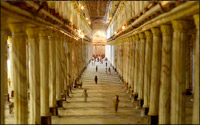 Herod may have been a great murderer, but he was a great builder. And he was not a person given over to modesty or one who did things on a small scale. Whatever he did was larger than life. Furthermore, money was no object – especially since it was not his money.
Herod may have been a great murderer, but he was a great builder. And he was not a person given over to modesty or one who did things on a small scale. Whatever he did was larger than life. Furthermore, money was no object – especially since it was not his money.
The two greatest buildings that Herod built were the Temple and his own palace. There is nothing left of his palace, but according to Josephus it was even more magnificent than the Temple, and regarding the Temple the Talmud says that, “He who did not see the Temple of Herod never saw a beautiful building in his life.” In a world of the Roman Coliseum, the Parthenon and other magnificent structures it was the building.
The Talmud says that Herod built it under the advice of Rabbi Baba ben Buta, a disciple of Shamai. In the upheavals that occurred, Herod arrested him and had him blinded. Then he was overcome by remorse. (Herod was often overcome by remorse, but it never prevented him doing the next maniacal act that would bring on regret.)
He came before the blinded Baba ben Buta, disguised his voice, and tried to get him to say seditious things against him (Herod). His hope was to get him to slip up and justify, retroactively, this terrible act that he did: blinding this great rabbi.
However, Baba ben Buta sad nothing bad despite Herod’s prodding. Herod was so overcome with sorrow that he admitted who he was and how much he regretted killing all the rabbis; that it was all a mistake. Then he asked what he should do for penance.
Baba ben Buta told him that he should use his talents and money to rebuild the Temple. Herod agreed.
Herod’s Temple
They began building it in about 19 BCE. It was basically completed by 30 CE, almost 50 years later. Most of it was built in the first five years.
Herod spared no expense. He brought marble from Carrara, Italy, and laid it on the floor of the Temple in such a way that it looked like the waves of the ocean; it gave one the feeling that he was walking on water. He brought gold, precious wood, tapestries and brickwork. It was an incredible project.
The famous Western Wall that remains standing today is the wall of the Temple Mount, not of the Temple itself. It, too, is from the time of Herod. It stood, according to Josephus, about 12 stories high. Today it is only about four to five stories high. There is just as much in the ground and above the ground, because the rubble of the centuries closed it up, while the top of the wall was dismantled by the Romans, Crusaders and Arabs. What we see today, in other words, is just a piece of a much greater wall.
Herod’s Death and Successor
Herod died in 4 BCE. (Both Hillel and Shamai outlived him.)
When he died his son, Archelaus, ascended to the throne. He would rule for ten years. Unfortunately, he inherited all of the bad habits of his father and almost none of the minor redeeming ones.
The Jews did not consider him Jewish and treated him as a foreign ruler. From the start, they were almost in open rebellion against him and everything that he stood for.
The Romans were now well aware of the danger that was brewing in the small country. This, coupled with the wave of conversions, which we discussed, frightened them. Therefore, Rome took a very strong interest in seeing that the country was somehow pacified.
Nevertheless, they still did not want to pacify it by force and preferred the Jews to do so by themselves. Therefore, they had Archelaus poisoned around the year 12 CE.
Agrippas
In his place, the grandson of Herod ascended the throne: Agrippas. (He is sometimes referred to as Herod Agrippas or Agrippas I.) He claimed to be the grandson of Herod, the son of Aristobulus and Mariamne, whom we discussed previously. However, there were those that said he was really descended from Herod. (Incest was just one of Herod’s bad habits.)
He was a person of nobility who became famed for his righteousness. He would be the last great king to rule over the Jewish people, someone mentioned almost universally with favor in the Talmud. His reign will be a time when both government and religion work in harmony and for the good of the people.
As per the Roman custom with the children of foreign leaders of lands they controlled, Agrippas was raised in Rome. By holding the children of the king hostage in Rome they hoped to thereby deter them from rebelling. When in Rome, he was raised in the household of Augustus Caesar, and later of Tiberius. He became friends with the emperor’s nephews, including the future emperor’s Caligula and Claudius. He was educated with them, played with them and was considered part of their circle.
Caligula
In the Roman power struggle to become emperor, Caligula emerged victorious, albeit it through killing the nephews who stood in his path. This was common practice in the brutal world of Roman politics. Poison was often the favored method of assassination. Indeed, there was a whole industry of professional poisoners.
At the death of Tiberius, Caligula became emperor of Rome. He was a certified madman, the epitome of lunacy seated on a throne, although it was by no means the first time that a raving lunatic became the emperor. Among his many acts, Caligula appointed a horse to the Roman senate (although if one knew the Roman senate perhaps that was not so insane).
Rome was subjected to a reign of terror. Caligula had thousands killed. He reverted back to primitive Roman paganism. Even through the Romans were officially pagan, the leaders had become less zealous about it. They did not believe in a lot of the nonsense any longer.
Nevertheless, Caligula not only believed in it but had himself elected as a god. Among the advantages in his mind was that no matter what he did he would not suffer the consequences in the Roman afterlife. He had statues of himself erected wherever he could, and people had to worship his image like that of the classic gods. He had dreams of becoming a permanent god on the order of Apollo, Zeus, etc.
He decreed that his statue be erected in the Temple in Jerusalem and that the Jews worship it. A similar decree had touched off the revolt of the Hasmoneans. It was an act that guaranteed to ignite a rebellion against Rome.
However, Agrippas interceded. He knew him from his days growing up in Rome. As mad a Caligula was, he heard Agrippas’ arguments and withdrew the order. The only place in the Roman world where the statue of Caligula did not appear was in Jerusalem.
I, Claudius
Eventually, the Romans had enough of Caligula, and his own soldiers, the Praetorian Guard, assassinated him. They looked to replace him with someone they felt would not be a strong leader so that the Senate, in effect, would have the power. They chose Claudius, who was a hunchback and who stammered – someone who possessed the veneer of a simpleton. In fact, this appearance had allowed Claudius to survive all of the court politics and intrigue that took the lives of others. However, beneath the façade lay a very sharp mind, as well as a great organizer with a steel will.
When the Senate installed Claudius to the throne they thought they were going to have a free ride, so to speak. Nevertheless, Claudius, perhaps more than any other, was able to strengthen the office of the emperor and diminish the power of the Senate.
Claudius and Agrippas were very good friends. As a reward for their friendship, he appointed Agrippas the king of Judea upon the death of Archelaus. He not only gave him Judea, but restored to him all the pieces of empire that Herod had built, and which had been taken away by the Romans after the death of Herod. Agrippas was now the king in what is today southern Lebanon and Syria, as well as trans-Jordan and pieces of the Nabatean kingdom in the Negev. Agrippas came back to Jerusalem in triumph and wielding great power.
Agrippas Cried
Agrippas behaved like a devout Jew and went out of his way to protect the Jewish people and Judaism from the Romans – not only from the Roman tax collector but also from the Roman lifestyle. He was truly interested in having a Jewish way of life.
He was also friends with many of the leading rabbis of his day. The spiritual leader at the time was Shimon, the son of Hillel. After the death of Shimon, Hillel’s grandson, Gamaliel, would become the Nasi or Prince/Leader. Agrippas was also friends with him, as well as the Sanhedrin, whom he listened to. It was a time of harmony, tranquility and economic stability. Not only were the Jewish people satisfied with him, but so were the Romans.
The Talmud (Sotah 41a) tells a famous story about him that shows his popularity. Once every seven years the king would publicly read the entire book of Deuteronomy. When Agrippas did so, he came to the verse, Do not place upon yourself [a king who is] a foreigner (Deuteronomy 17:15). The king had to be someone who is from the Jewish people. When Agrippas read that, tears streamed from his eyes. He realized that he did not meet that requirement.
However, the rabbis told him not to weep. They said to him, “Do not fear, Agrippas. You are our brother.” That is how they felt toward him; they had not had a king as good as him for a long time.[1]
Agrippas died suddenly in 44 CE. There is no record of whether he died of natural causes or foul play. Nevertheless, his death was a tremendous shock to the Jewish people, as well as in the Roman Empire. His death also marks the end, for all effective purposes, of the Jewish commonwealth under the Romans. The next 20 years will be decades of constant turmoil.
His son, Agrippas II, was a throw-back to Herod. He was Roman, anti-Judaism and anti-Jews. He undid in a very short period of time everything his father had built up. With him the country began a headlong slide toward the war against Rome.
[1] Nevertheless, the Talmud says, the rabbis should not have done that. They were guilty of flattery. As a result, they hastened the coming of the downfall of commonwealth.











